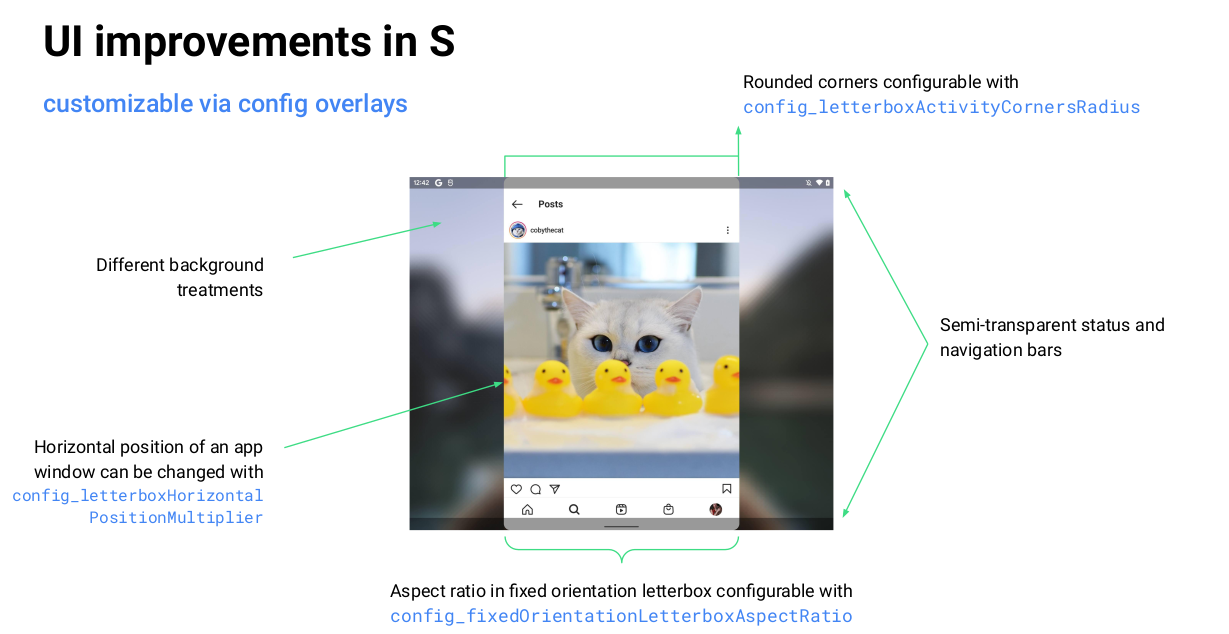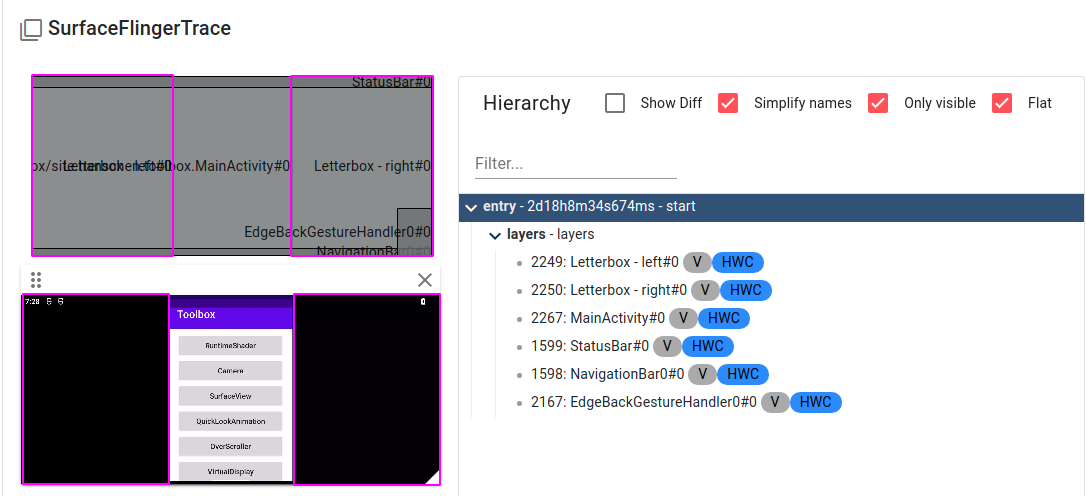1. 简介
随着越来越多大屏和折叠屏设备出现,很多应用并未对不同尺寸的设备进行 UI 适配,这时候应用选择以特定的宽高比显示(虽然 Google 不建议这这样做,官方还是希望开发者可以对不同的屏幕尺寸进行自适应布局~),当应用的宽高比和它的容器比例不兼容的时候,就会以 Letterbox 模式打开。

Letterbox 模式下界面会以指定的比例显示,周围空白区域可以填充壁纸或者颜色。至于 Letterbox 的外观可受以下因素影响:
config_letterboxActivityCornersRadius: 界面圆角大小config_letterboxBackgroundType: 背景填充类型,分别有:LETTERBOX_BACKGROUND_APP_COLOR_BACKGROUND: 颜色受android:colorBackground影响LETTERBOX_BACKGROUND_APP_COLOR_BACKGROUND_FLOATING: 颜色受android:colorBackgroundFloating影响LETTERBOX_BACKGROUND_SOLID_COLOR: 颜色受config_letterboxBackgroundColor影响LETTERBOX_BACKGROUND_WALLPAPER: 显示壁纸,此选项和FLAG_SHOW_WALLPAPER类似,会导致壁纸窗口显示
config_letterboxBackgroundWallpaperBlurRadius: 壁纸模糊程度config_letterboxBackgroundWallaperDarkScrimAlpha: 壁纸变暗程度
2. 何时触发
Letterbox 的触发条件一般有:
android:resizeableActivity=false且应用声明的宽高比与容器不兼容的时候(如屏幕宽高超出android:maxAspectRatio)setIgnoreOrientationRequest(true)系统设置忽略屏幕方向后,以横屏模式下打开一个强制竖屏的界面
3. 实现方案
Letterbox 显示的实现并不复杂,Android 12 在 ActivityRecord 中增加了 LetterboxUiController 用以控制 Letterbox 的布局和显示,先来看看处于 Letterbox 模式时 SurfaceFlinger 状态:

可以看到,跟正常情况相比,除了界面本身的大小和位置被缩放到指定比例外,四周还多了两个 Layer,挂在 ActiviRecord 节点下面,这两个 Layer 可根据配置进行指定的颜色填充,如果背景是壁纸的话,还可以设置壁纸的 dim 值和模糊程度,这些都可以通过 SurfaceControl 接口轻松实现。
下面简单分析一下代码:
// LetterboxUiController.java
void updateLetterboxSurface(WindowState winHint) {
final WindowState w = mActivityRecord.findMainWindow();
if (w != winHint && winHint != null && w != null) {
return;
}
// 对界面四周需要显示的 Layer 进行位置计算
layoutLetterbox(winHint);
if (mLetterbox != null && mLetterbox.needsApplySurfaceChanges()) {
// 对 Surface 执行创建、参数设置等操作
mLetterbox.applySurfaceChanges(mActivityRecord.getSyncTransaction());
}
}
void layoutLetterbox(WindowState winHint) {
final WindowState w = mActivityRecord.findMainWindow();
if (w == null || winHint != null && w != winHint) {
return;
}
updateRoundedCorners(w);
updateWallpaperForLetterbox(w);
// 是否进入 Letterbox 模式的关键判断
if (shouldShowLetterboxUi(w)) {
if (mLetterbox == null) {
// 把具体逻辑委托给 Letterbox
mLetterbox = new Letterbox(() -> mActivityRecord.makeChildSurface(null),
mActivityRecord.mWmService.mTransactionFactory,
mLetterboxConfiguration::isLetterboxActivityCornersRounded,
this::getLetterboxBackgroundColor,
this::hasWallpaperBackgroudForLetterbox,
this::getLetterboxWallpaperBlurRadius,
this::getLetterboxWallpaperDarkScrimAlpha);
mLetterbox.attachInput(w);
}
mActivityRecord.getPosition(mTmpPoint);
// Get the bounds of the "space-to-fill". The transformed bounds have the highest
// priority because the activity is launched in a rotated environment. In multi-window
// mode, the task-level represents this. In fullscreen-mode, the task container does
// (since the orientation letterbox is also applied to the task).
final Rect transformedBounds = mActivityRecord.getFixedRotationTransformDisplayBounds();
final Rect spaceToFill = transformedBounds != null
? transformedBounds
: mActivityRecord.inMultiWindowMode()
? mActivityRecord.getRootTask().getBounds()
: mActivityRecord.getRootTask().getParent().getBounds();
// 位置计算
mLetterbox.layout(spaceToFill, w.getFrame(), mTmpPoint);
} else if (mLetterbox != null) {
mLetterbox.hide();
}
}
// Letterbox.LetterboxSurface.java
public void applySurfaceChanges(SurfaceControl.Transaction t) {
if (!needsApplySurfaceChanges()) {
// Nothing changed.
return;
}
mSurfaceFrameRelative.set(mLayoutFrameRelative);
if (!mSurfaceFrameRelative.isEmpty()) {
if (mSurface == null) {
// 创建挂在 ActivityRecord 节点下的 Surface,设置为 ColorLayer 类型
createSurface(t);
}
// 设置颜色、位置、裁剪
mColor = mColorSupplier.get();
t.setColor(mSurface, getRgbColorArray());
t.setPosition(mSurface, mSurfaceFrameRelative.left, mSurfaceFrameRelative.top);
t.setWindowCrop(mSurface, mSurfaceFrameRelative.width(),
mSurfaceFrameRelative.height());
// 对壁纸背景设置透明度和模糊度
mHasWallpaperBackground = mHasWallpaperBackgroundSupplier.get();
updateAlphaAndBlur(t);
t.show(mSurface);
} else if (mSurface != null) {
t.hide(mSurface);
}
if (mSurface != null && mInputInterceptor != null) {
mInputInterceptor.updateTouchableRegion(mSurfaceFrameRelative);
t.setInputWindowInfo(mSurface, mInputInterceptor.mWindowHandle);
}
}
4. 小结
本文只是简单分析了下 Letterbox 模式的触发条件和显示的大概逻辑,还有很多细节没有涉及,比如详细的触发逻辑判断可以查看 LetterboxUiController#shouldShowLetterboxUi 方法